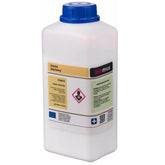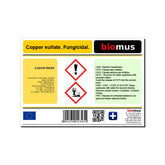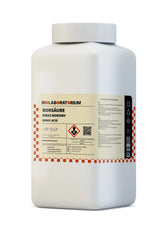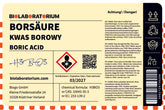Cesium sulfate, also known as Cs₂SO₄, is an important inorganic salt used in a wide variety of laboratory applications. As an alkali metal sulfate, it is characterized by high density and stability, making it a valuable material in chemical analysis and research.
Properties of cesium sulfate
Cesium sulfate is a crystalline, white powder with a very high density of approximately 4.2 g/cm³. This value is significantly higher than other alkali metal sulfates such as sodium sulfate (2.7 g/cm³) or potassium sulfate (2.6 g/cm³). The high density results from the large atomic radius of cesium, which as the heaviest alkali metal contributes significantly to the molecule's mass.
In addition to density, cesium sulfate is also characterized by high thermal and chemical stability. The melting point is approximately 1,300 °C, enabling its use in high-temperature applications. Furthermore, the salt is highly resistant to most acids and bases, making it an ideal material for inorganic analysis.
Applications of Cesium Sulfate
The unique properties of cesium sulfate make it a valuable material in various laboratory applications:
Increasing Solution Density
Due to its high density, cesium sulfate is frequently used to increase the density of solutions. This is significant, for example, in mineralogy and geology, where heavy minerals need to be separated from lighter ones. By adding cesium sulfate, solutions with densities of up to 3 g/cm³ can be produced, enabling efficient separation.
Inorganic Analysis
In inorganic analysis, cesium sulfate is used for sample preparation and stabilization. On one hand, it can serve as a matrix component to optimize the solution properties of samples. On the other hand, due to its stability, it is excellent as a carrier material for analysis techniques such as atomic absorption spectroscopy (AAS) or inductively coupled plasma mass spectrometry (ICP-MS).
Crystal Chemistry
Cesium sulfate also finds application in crystal chemistry and physics. Due to its crystal structure and ionic radii, it is suitable for studying crystal growth, phase transitions, and solid-state structures. Furthermore, cesium sulfate crystals can be used in optical and electronic components.
Further Applications
In addition to the main applications mentioned, cesium sulfate is also used in other areas such as ceramic production, the glass industry, or medical technology. Here, the special physical and chemical properties of the salt are utilized.
Procurement and Handling of Cesium Sulfate
Cesium sulfate is a relatively rare and expensive salt that can typically only be obtained from specialty chemical suppliers or directly from manufacturers. Prices can vary significantly depending on purity level and quantity.
When handling cesium sulfate, certain safety aspects must be considered. As a cesium salt, it is slightly radioactive, which is why protective measures such as gloves and good ventilation are required during handling. Additionally, due to its density, cesium sulfate is a hazardous material that must be properly labeled and secured during transport and storage.
Conclusion
Cesium sulfate is a fascinating inorganic salt with unique properties that make it a valuable material in chemical analysis and research. Its high density, stability, and purity make it an indispensable tool in laboratories and research institutions worldwide. Despite the relatively high costs, using cesium sulfate is worthwhile in many cases to achieve precise and reliable analysis results.















